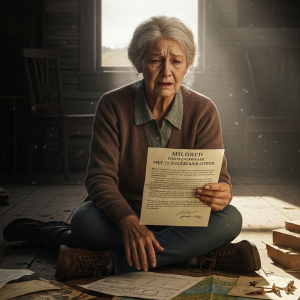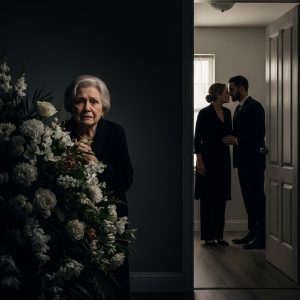My name is Eileen, and for three years, I’ve been living a lie. Not the kind you tell to deceive others, but the kind you tell yourself when you need to discover who people really are when they think you have nothing left to offer.
The dinner invitation came on a Tuesday. My son Darren’s voice was strained, the way it always was when his wife, Thalia, was listening. “Mom, would you like to come over for dinner Friday? Thalia’s making her famous lasagna.”
Famous? I almost laughed. The woman could barely boil water. “That sounds lovely, sweetheart. What time?”
“7:30. And Mom…” he paused. I could practically hear Thalia’s sharp whisper in the background. “Maybe dress a little nicer this time? You know, just to look… presentable.”
Presentable. I stared at my reflection after hanging up. Gray hair in a simple bun, no makeup, a faded cardigan. For three years, this had been my uniform: the grieving widow, struggling to make ends meet, dependent on her son’s occasional generosity. It was a carefully crafted illusion.
On Friday, I walked the six blocks to their house. It was the same house I’d bought them as a wedding gift seven years ago—a fact they were blissfully unaware of. Darren opened the door with a forced smile and an obligatory hug. At 34, he was a man I barely recognized, the light in his eyes dimmed by his marriage.
“Eileen.” Thalia’s voice cut through the air like a blade. She was a vision of aggressive beauty, wearing a dress that cost more than my supposed monthly rent. She looked me up and down with barely concealed disgust. “Of course. Family dinner and all that.”
The dining room was set with their best china. I noticed immediately that my place setting was different—older plates, a mismatched glass, a bent fork. A small, deliberate detail that screamed my status in this house: an afterthought.
The conversation limped along. Darren talked about his job, Thalia talked about herself. “We’re thinking of getting new furniture,” she announced. “Something more modern. The stuff we have now is so outdated.”
I remembered picking out that furniture with them. Thalia had gushed about how perfect it was. That was before she decided everything in her life, including her husband’s mother, needed an upgrade.
“That sounds expensive,” I said mildly.
Thalia’s eyes flashed. “Well, some people prioritize making their homes beautiful. Some people understand you have to invest in quality.” The barb was meant for me. I was neither beautiful nor quality, and certainly not an investment.
“Actually, Mom,” Darren began, his voice reluctant. “We wanted to talk to you about something.”
Thalia leaned forward, her expression shifting into one of faux concern. “Eileen, we’ve been worried about you. It’s been three years since Harold passed, and you’re still not getting back on your feet.”
“I’m managing fine,” I said quietly.
“Are you, though?” she pressed, her voice patronizing. “You can barely afford your rent. You shop at thrift stores. You don’t even have a car anymore.”
Every choice had been deliberate. The small apartment was paid for in cash. The clothes were a costume. The lack of a car was a preference. “I get by,” I said.
“Getting by isn’t living, Mom,” Darren added, and for a moment, a flicker of my real son surfaced. But Thalia quickly took over.
“The thing is, Eileen, we can’t keep helping you forever. We have our own future to think about. What we’re trying to say is… maybe it’s time you thought about getting a job.”
The suggestion hung in the air. “A job?” I repeated.
“Yes!” Her eyes lit up. “Walmart is always hiring greeters. Something to give you purpose. Independence. Self-respect.”
The irony was staggering. After running a successful business with Harold for twenty years, after building a fortune that could buy their entire neighborhood, she wanted me to be a Walmart greeter.
She warmed to her theme, clearly pleased with herself. “You’ve gotten too comfortable being dependent on Darren. It’s not healthy. Get a job and stop being a leech.”
The final word landed. Leech. I looked at this woman who had never worked a day in her life, who lived in a house she didn’t know I owned, and I didn’t feel anger. I felt a cold, final clarity. The test was over. I burst out laughing.
They stared at me, bewildered. My laughter wasn’t joyful; it was the sound of a dam breaking after three long years. I wiped a tear from my eye and looked directly at Thalia. For the first time, I let her see the steel behind the soft, grieving widow persona.
“Sweetheart,” I said, my voice calm and low. “Find yourself a new place to live.”
I stood up, my movements deliberate. “Thank you for dinner. The lasagna was exactly what I expected.” At the door, I turned back. Darren looked confused. Thalia looked rattled. “Oh, and Thalia? About that job advice? You might want to start updating your own resume.”
Three days later, Darren called. His voice was cautious, as if speaking to a stranger. “Mom. Can we talk?”
“Of course, sweetheart. Would you like to come over?”
In three years, he had never once visited my apartment. He arrived an hour later, looking around the small, shabby space with unconcealed pity. “Mom, this place is… depressing.”
“It serves its purpose,” I said, pouring him a cup of the expensive coffee I kept hidden. He took a sip, surprised by the quality.
“About Friday night,” he began. “Thalia’s really upset. She thinks you threatened her.”
“What do you think?” I asked, meeting his gaze.
“I think something’s going on that I don’t understand. The way you looked at her… the things you said…”
“The things I said were true,” I replied. I decided to give him a glimpse behind the curtain. “Darren, do you remember what your father used to say about people who mistake kindness for weakness?”
“He said they learn the difference eventually.”
“Exactly. For three years, I have been kind. I have watched your wife treat me like a burden, an embarrassment. Tell me, when was the last time she asked how I was doing as a person, not just how I was managing financially?”
He had no answer. He just stared into his coffee cup.
“Some people are about to learn that actions have consequences,” I told him.
I stood and walked to my bookshelf. Hidden behind a row of paperbacks was a manila folder. I placed it on the table in front of him. “There’s something you need to know about your mother.”
Inside were bank statements, investment portfolios, and property deeds. I watched his face as he flipped through page after page, his eyes widening in disbelief. Account balances with seven figures. Properties across three states.
“Mom… what is this?” he whispered.
“This is who I really am,” I said. “Your father and I were very successful. When he died, I inherited everything. I’m worth approximately $5 million.”
He stared at me as if I were an alien. “But… you live here. You shop at thrift stores.”
“By choice,” I said. “Because I needed to know who would love me when they thought I had nothing.”
The words hit him like a physical blow. The realization of the last three years dawned in his eyes. “You’ve been… testing us.”
“I’ve been protecting myself. From people like your wife.”
“But I’m your son!”
“Yes. And I needed to know if you were still my son, or if you had become something else entirely. When was the last time you stood up for me when she was being cruel?”
Each question was a quiet knife. He flinched. “I didn’t realize… I chose not to see it because it was easier.”
“What happens now?” he finally asked, his voice barely audible.
“Now,” I said softly, “we find out if it’s too late for you to remember who you used to be. As for Thalia, she is about to discover that some people are not as helpless as they appear.”
I gave them a week. A week for Darren to look at his wife with new eyes. A week for Thalia to stew. The call came on a Wednesday. Thalia’s voice, sharp and demanding. “Eileen, we need to talk. Right now.”
“Good morning to you, too, Thalia.”
“Don’t play games. Darren told me about the money. What kind of sick game have you been playing?”
“What kind of game do you think?”
“You let us think you were poor! You let me worry about you, try to help you!” The revisionist history was breathtaking.
“You’re coming over tonight. 7:00,” she commanded. “You owe us an explanation.” The line went dead.
I finished my coffee. Then I went to my real closet. In the back, behind the thrift store cardigans, hung the clothes of the woman I truly was. I chose an elegant black dress, real jewelry, and shoes that cost more than Thalia spent on groceries in a month. It was time to stop hiding.
I arrived at their house at exactly 7:00. The same house I’d bought for them, a fact they were about to learn. Darren opened the door, his eyes wide. “Mom… you look… like yourself again.”
Thalia appeared behind him, dressed for battle in a designer outfit that looked like a cheap costume next to the quiet confidence of real wealth. “Well, well,” she sneered. “The poor widow has quite the wardrobe hidden away.”
“Among other things,” I replied mildly.
We sat in the living room I had furnished for them. Thalia positioned herself like a prosecutor. “Let’s hear it. The whole truth.”
“What would you like to know?”
“Everything. How much money? Why did you lie? What kind of person pretends to be poor?”
“The kind of person who wants to know who her real family is,” I said calmly.
“I’m your daughter-in-law!”
“Are you? Then perhaps you’d like to explain why you told the neighbors I was becoming senile?” Thalia’s face went pale. Darren stared at her. “Or why you suggested to the mailman I might need to be placed in a care facility?”
“I was concerned!” she stammered. “You were acting strange!”
“Or,” I said softly, “you were laying the groundwork for having me declared incompetent so you could get your hands on what you thought was Harold’s insurance money.”
The accusation hung in the air like a blade. “That’s insane!” she gasped.
I reached into my purse and pulled out an envelope. “Is it? Because three months ago, you consulted an elder law attorney. You inquired about obtaining guardianship over me.” I laid out the printed emails, phone records, and consultation notes. “You wanted to know how quickly you could liquidate assets for the ‘patient’s own good.’”
The color drained from her face. Darren shot to his feet. “Thalia, please tell me this isn’t true.”
“It’s not what it looks like!” she cried.
“Then explain the $43,000 in credit card debt you’ve been hiding from your husband,” I said, producing another set of documents.
Thalia finally broke. But her tears weren’t of remorse; they were of rage. “You!” she hissed at me. “You vindictive, manipulative… you set me up!”
“I didn’t set you up, dear,” I replied, standing to face her. “I simply stopped protecting you from the consequences of your own choices.”
“You think you’ve won? You wanted to destroy my marriage, and you did it!”
“I didn’t destroy your marriage, Thalia. You did. The moment you decided my son was just a stepping stone.” I moved closer. “You’re going to pack your things, and you’re going to leave this house. Tonight.”
She laughed, high and wild. “You can’t make me leave my own home!”
“Actually, I can.” I pulled out one last document. The deed to the house, with my name clearly visible as the owner. “This house belongs to me. It always has. You and Darren have been living here as my guests for seven years.”
The silence was absolute. Darren stared at the deed as if it were written in a foreign language.
Thalia turned to him, desperate. “Darren! Say something!”
He finally looked up at her, his expression clear for the first time in years. “Get out,” he said quietly.
“What?”
“Get out of my mother’s house.”
The calls started the next morning. Relatives, one by one, parroting Thalia’s narrative: poor, innocent Thalia, victim of a vindictive, mentally unstable mother-in-law. I listened to each one, said little, and made mental notes. Let them show their true colors.
Thalia hadn’t just left; she’d launched a smear campaign. She was painting herself as the victim of an unstable older woman who’d suddenly snapped. Two days later, an exhausted Darren met me at a café.
“She’s destroyed me,” he said. “She told my boss you have dementia and that I’ve been distracted at work because of it. She suggested they might want to reconsider my job performance.” The cruelty was breathtaking.
“There’s more,” he said. “She’s seen a lawyer. She’s claiming she has tenant rights and that you coerced her into leaving.”
“She doesn’t have a case,” I said.
“She’s not trying to win, Mom. She’s trying to make our lives hell.” He showed me her social media posts—masterfully crafted cries for sympathy, alluding to manipulation and psychological abuse. Dozens of comments offered support and condemned the unnamed family members who had wronged her.
“She’s good,” I admitted.
“She’s evil.”
“No, she’s desperate. And desperate people make mistakes.” I pointed to his phone. “Look at what’s missing from her posts. She never once mentions loving you. She’s not heartbroken about losing her marriage. This isn’t grief, sweetheart. This is rage at being caught.”
The realization hit him. “What do we do?”
“We let her keep digging,” I said. “Confident people get careless. They overreach. And when she makes her final, fatal mistake, we’ll be ready.”
The fatal mistake came a week later. A call from a Detective Sarah Martinez.
“Mrs. Holloway, I need to ask you some questions about a report filed against you. Allegations of elder abuse and financial exploitation.”
The audacity was stunning. Thalia had accused me of being a victim and Darren of being the abuser, with her as the heroic whistleblower. I called my lawyer, Jonathan, and met him at the police station. I was no longer in costume. I was dressed in a tailored suit, carrying a briefcase of evidence.
Detective Martinez looked surprised. “You’re not quite what I expected based on the report.” She laid out Thalia’s claims: I was a vulnerable, abused woman forced to live in squalor, and Darren was stealing from me. Her “evidence” was photos of my shabby apartment and my low-balance checking account statement.
“Detective,” I said calmly, “I have some documents that might interest you.”
I placed my real financial statements on the table, showing assets of $5 million. The detective’s eyes widened. I then provided the evidence of Thalia’s consultation with the elder law attorney, her secret debt, and her online search history for “how to prove someone is mentally incompetent.”
“If what you’re telling me is true,” the detective said, her expression grim, “then Miss Thalia has filed a false police report. That’s a serious crime.”
“We want her prosecuted to the full extent of the law,” Jonathan stated.
“And a restraining order,” I added.
Two hours later, Thalia was arrested. I was at home—my real home, a luxury penthouse overlooking the city—when Darren called.
“Mom, the police just arrested Thalia. And I went by your apartment… it’s empty. Where are you?”
“I’m at home, sweetheart,” I said. “My real home. Come to the Meridian Towers. I’ll explain everything.”
He arrived thirty minutes later, staring at the art and antiques, the floor-to-ceiling windows. “This is where you’ve been living?”
“This is where I’ve always lived,” I told him. He sank into a chair, the full weight of the past three years finally crashing down on him.
Six months later, the divorce was final. Thalia was sentenced to six months in county jail and three years of probation for filing a false police report. The family members who had rushed to condemn me had sent shame-faced apologies. Some relationships could be repaired; others would never be the same.
Darren was rebuilding his life. He was seeing a teacher named Rebecca—a kind, normal woman who drove a ten-year-old Honda and thought Olive Garden was a fancy restaurant. She knew nothing about our money.
“How does she make you feel?” I asked him one evening over the phone.
“Like I’m enough,” he said. “Just as I am.”
“Then trust that feeling,” I told him. “You’re not the same man who fell for Thalia’s games. You’re wiser now.”
I had spent three years living in the shadows, testing the people I loved. It had cost me time and relationships, but it had saved my son and exposed a predator. Most importantly, it had taught me that I was stronger than I ever imagined.
As I stood on my terrace, looking out over the city lights, I knew the test was finally over. I was no longer the grieving widow or the vulnerable old woman. I was Eileen Holloway: successful, devoted, and a survivor. Whatever came next, I would face it as myself. And after three years of elaborate pretense, that felt like the greatest victory of all.




